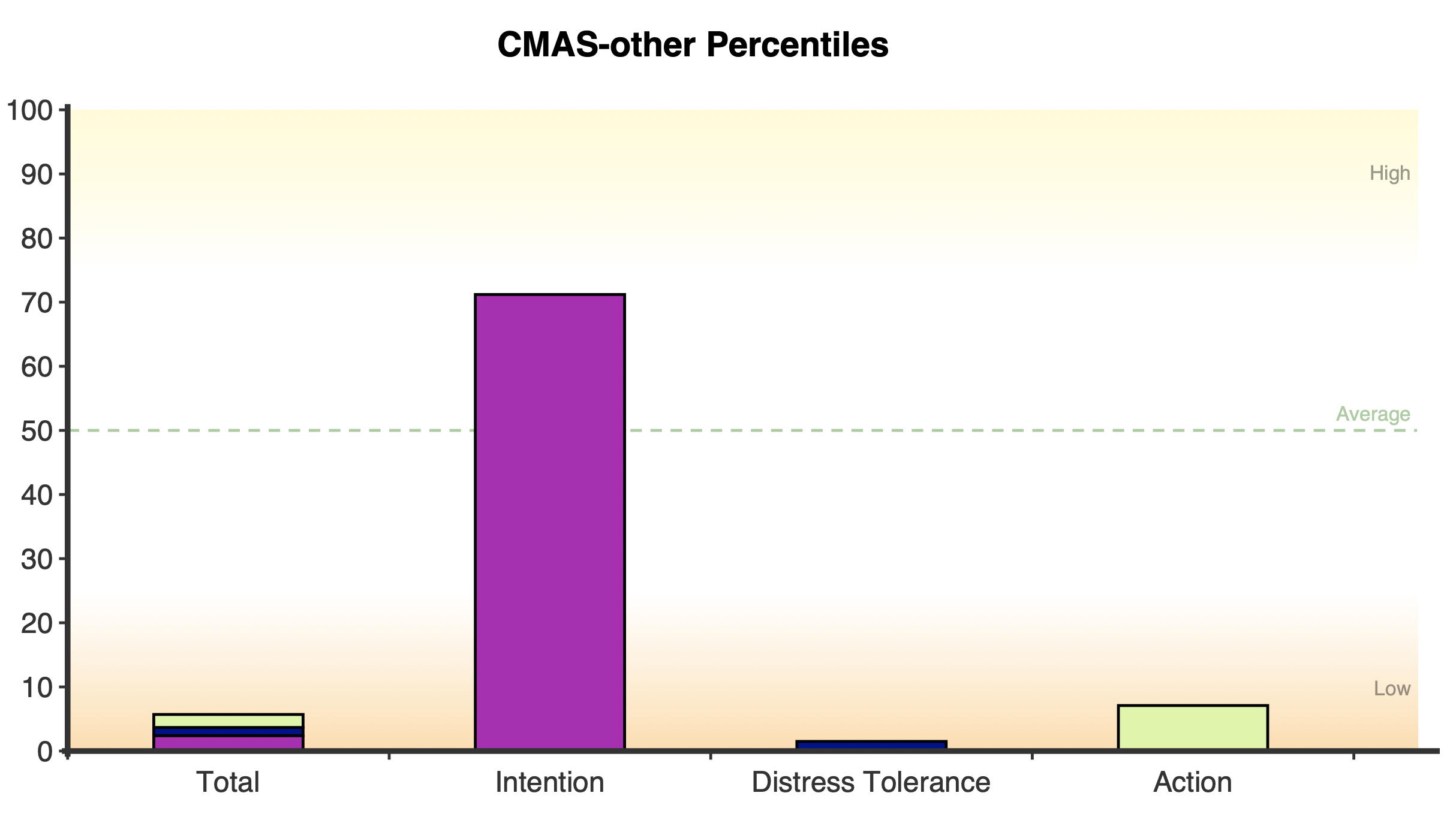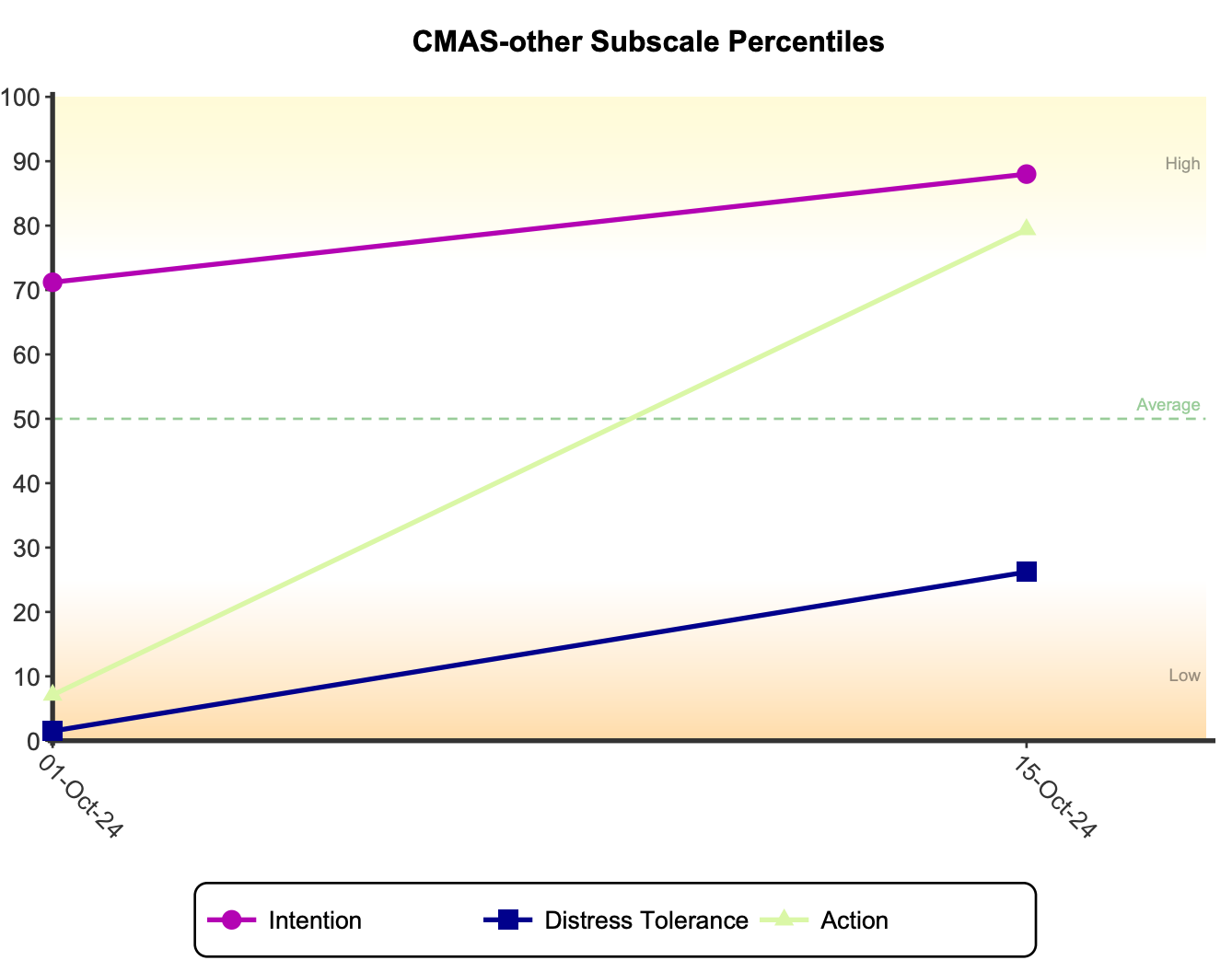The Compassion Motivation and Action Scale – Compassion (CMAS-other) measures compassionate intension and action towards other people. It is a companion measure to CMAS-self, which measures self-compassion (Steindl et al., 2021).
The CMAS-other has three subscales:

All items are summed to provide an overall score, with higher scores indicative of more self-compassion. Subscale scores are also provided to enable a comparison between subscales:

A normative percentile for the total score and subscales are calculated based on a normative sample (Steindl et al., 2021), indicating how the respondent scored in relation to a typical pattern of responding for adults. For example, a percentile of 83 or less indicates the individual has more self-compassion than 83 percent of the normal population.

Results are presented in a graph, which indicates the percentile for total compassion and sub-scales compared to the normative sample, with a dotted line at 50 indicating average compassion towards others.
The CMAS-other was developed by Steindl et al. (2021) using an initial item pool that was generated on the basis of a review of existing measures in combination with the dimensions of motivational language in motivational interviewing. The initial item pool was disseminated to international experts in compassion and/or motivational interviewing literature for feedback and to ensure that wording and content were culturally relevant. Following this process, the initial pool of items was evaluated via exploratory and confirmatory factor analysis to reduce the items further.
There was very good internal consistency present for the CMAS-other with an overall Chronbach’s alpha of 0.88 and subscale consistencies of 0.87 (Intention), 0.88 (Distress tolerance), and 0.96 (Action).
For 621 adults from Australia, USA, UK, and New Zealand, the mean score was 61.16 (SD = 10.22) for the CMAS-other, 17.19 (SD = 3.24) for the Intention subscale, 17.08 (SD = 3.27) for the Distress Tolerance subscale, and 26.90 (SD = 7.43) for the Action subscale (Steindl et al., 2021).
Steindl, S. R., Tellegen, C. L., Filus, A., Seppälä, E., Doty, J. R., & Kirby, J. N. (2021). The Compassion Motivation and Action Scales: a self-report measure of compassionate and self-compassionate behaviours. Australian Psychologist, 56(2), 93–110. https://doi.org/10.1080/00050067.2021.1893110
Crocker, J., & Canevello, A. (2012). Creating and undermining social support in communal relationships: The role of compassionate and self-image goals. Journal of Personality and Social Psychology, 95(3), 555–575.
Kim, C., et al. (2020). Exploring the psychophysiological effects of compassion-focused therapy. Frontiers in Psychology, 11, 2364.
Kirby, J. N., & Laczko, D. (2017). The role of mindfulness in compassion-based interventions. Clinical Psychology Review, 52, 46–59.
Kirby, J. N. (2016). The clinical psychology of compassion. Clinical Psychologist, 20(3), 105–116.
Klimecki, O., et al. (2014). The neuroscience of compassion. Psychological Science, 25(3), 376–385.
Macbeth, A., & Gumley, A. (2012). Exploring the association between compassion and psychological well-being. Clinical Psychology Review, 32(6), 545–552.
Matos, M., et al. (2017). Effects of compassion cultivation training on psychological and physiological well-being. Mindfulness, 8(4), 960–969.
Seppala, E. M., et al. (2012). Loving-kindness meditation: A tool to increase compassion for others. Psychological Science, 24(1), 48–55.
NovoPsych’s mission is to help mental health services use psychometric science to improve client outcomes.
© 2023 Copyright – NovoPsych – All rights reserved